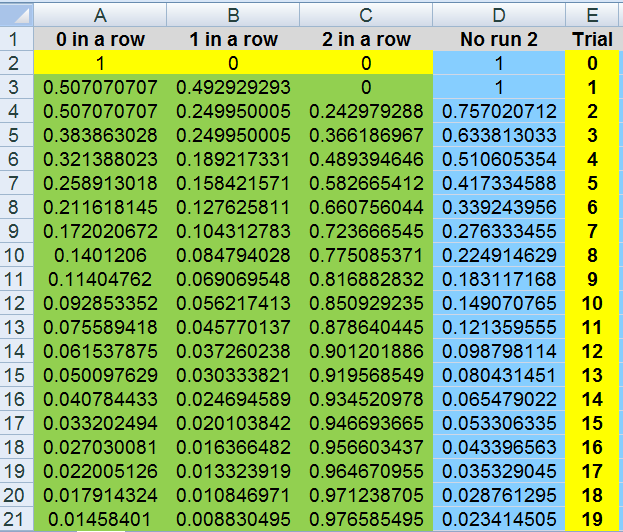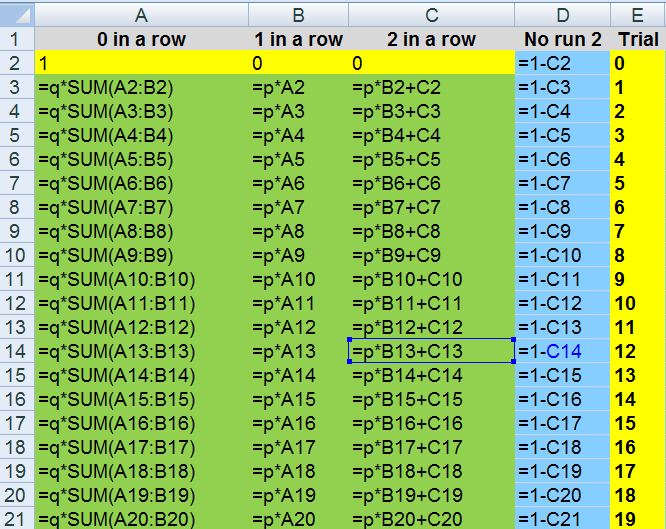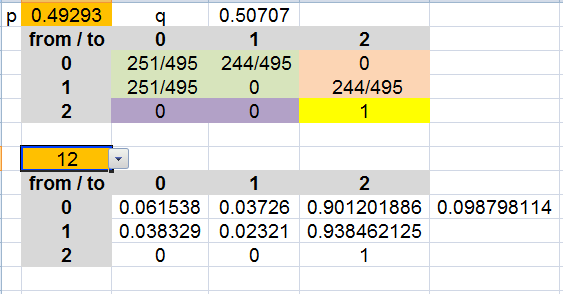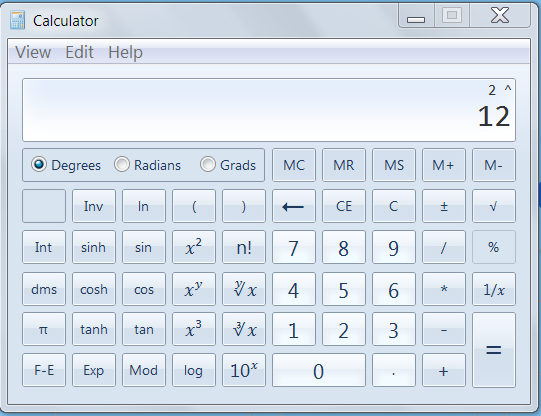Thread Rating:
Lets say I choose Pass line and only pass line
I play at this table for a period of 12 pass/don't pass decisions.
What is the likelihood that I will not win back to back at least one time
I can lose 10 out of 12 bets as long as the 2 wins are back to back
Quote: richbailey86How likely is it to NOT win at least 2 bets IN A ROW within 12 decisions.
Lets say I choose Pass line and only pass line
I play at this table for a period of 12 pass/don't pass decisions.
What is the likelihood that I will not win back to back at least one time
I can lose 10 out of 12 bets as long as the 2 wins are back to back
The probability of winning two in a row:
.4929 * .4929 = 0.24295041
Therefore, the probability of playing two Pass Line bets and losing one, the other, or both is .75704959.
If you look at twelve total PL bets, then you had the potential to win two in a row on eleven different occasions, because you couldn't have won two in a row STARTING with the twelfth bet.
1-(.75704959)^11 = 0.95318687703
Therefore, the probability that you will make eleven pairs of two bets and win at least two in a row once is 95.31869% and the probability that you will not win two in a row at all is 4.68131%.
Mission - are each of the 11 "pairs" necessarily independent, considering that each consecutive pair shares a result?
https://wizardofvegas.com/forum/gambling/craps/16060-beauty-of-probability/4/#post301921
Quote: bahdbwoy7craps had .0987 of no run with a similiar question
https://wizardofvegas.com/forum/gambling/craps/16060-beauty-of-probability/4/#post301921
Thanks
I love them
I do not even know what mission came up with. His method to me loooooks to calculate the expected number of runs, or lack of them.Quote: ThatDonGuyMission - are each of the 11 "pairs" necessarily independent, considering that each consecutive pair shares a result?
not any known probability in our universe, but we all could be wrong, yes?
maybe a new pair of shoes might help ;)
really? you listed all 2^12 outcomes and counted?Quote: ThatDonGuyI did a brute force calculation, and got 9.8798%
that is using the force, I say. I love brute or is that BRUT...
sounds the same to me but smells great, in me opinion
exercise is good for many too.
a streak calculator would be an easy solution and just subtract that value from 1 as most calcs figure the prob of at least 1 success.
How about the 14th Fibonacci number as a quick close answer?
it only works for 50% probs like a fair coin flip but it should give us the lowest probability as the pass line bet success rate is close to 49.3%, slightly lower than 50%
that # = 377 (can be found too in Pascal's triangle and who does not like triangles?)
377/2^12 = 377/4,096 or arounds about 0.092041016
Ah, mission was way off Houston (i was just there too)
Here, I solved this as did a 10 year old using very very simple simple math ands a spread sheet (I used excel)
Merry Christmas and Happy Holidays and Happy New Years
in cell D14 lies the gift

the cell formulas to do this yourself or is that elves

if you do not get it
just try it out
A2 to C2 are easy, just 1,0,0
A3 to D3 are easy too.
just fill them down (A3 to D3) how far you wants.
It really is up to yous
off to deliver the good and bad gifts this year
Sally says
Quote: mustangsally
really? you listed all 2^12 outcomes and counted?
Yes - I couldn't think of another way to calculate it accurately.
Well, "I" didn't count them - my 4.7GHz PC did.
Oh, and remember, you can use [sup] and [/sup] for superscripts - e.g. 212 instead of 2^12
Ah, Eye seeQuote: ThatDonGuyYes - I couldn't think of another way to calculate it accurately.
I figured wrong then, Me thought that you would do a simple Markov chain
like so

I use a udf
but P*P= P^2*P=P^3*P^2*P^2 would work innnnn Excel too, ugh
I was going to actually put 4,096 right from my win7 calcQuote: ThatDonGuyWell, "I" didn't count them - my 4.7GHz PC did.
Oh, and remember, you can use [sup] and [/sup] for superscripts - e.g. 212 instead of 2^12
but I was in a hurry as usual.
My calc uses 2^ and I like it.

I still LOVE triangles!
Sally
almost forgot, for those that use R
(I do a lot)
> #####################################################
> # runs.m(m,N,p)
> #
> # Probability of at least 1 run of length m or more
> # in N trials with probability p of success.
> # Uses Markov chain.
> #####################################################
>
> require(expm)
Loading required package: expm
Loading required package: Matrix
Loading required package: lattice
Attaching package: ‘expm’
The following object is masked from ‘package:Matrix’:
expm
>
> runs.m = function(m,N,p) {
+ q = 1-p
+ A = matrix(rep(0,(m+1)^2),nrow=m+1)
+ A[1,1:m] = q
+ A[2:(m+1),1:m] = diag(p,m,m)
+ A[m+1,m+1] = 1
+ v = c(1,rep(0,m))
+ (A%^%N %*% v)[m+1]
+ }
> print(1- runs.m(2,12,244/495),12)
[1] 0.0987981138517
>
that comes from the basic matrix program
#####################################################
# runs.m(m,N,p)
#
# Probability of at least 1 run of length m or more
# in N trials with probability p of success.
# Uses Markov chain.
#####################################################
require(expm)
runs.m = function(m,N,p) {
q = 1-p
A = matrix(rep(0,(m+1)^2),nrow=m+1)
A[1,1:m] = q
A[2:(m+1),1:m] = diag(p,m,m)
A[m+1,m+1] = 1
v = c(1,rep(0,m))
(A%^%N %*% v)[m+1]
}
print(runs.m(2,12,244/495),12)
U B Good
Quote: mustangsallyHow about the 14th Fibonacci number as a quick close answer?
I noticed that, if P(n) is the probability of not getting two (or more) wins in a row over n trials with individual win probability = p:
P(1) = 1
P(2) = 1 - p2
P(n) = (1-p) P(n-1) + p(1-p) P(n-2), since if the first trial is a loss, the probability is the same as for n-1 trials, and if the first trial is a win, the second needs to be a loss, at which point the probability is the same as for n-2 trials
I tried deducing a recursive formula, but I noticed some strange patterns:
the p0 term = 1
the p1 term = 0
the p2 term = 1 - n
the p3 term = n - 2
the p4 term = (n - 4) (n - 3) / 2
the p5 term = - (n - 4)2
I did a matrix-based recursive solution, and got:
P(n) = ( (1 - p2) (Jn-1 - Kn-1) + JK (Jn-2 + Kn-2) ) / (J + K)
where J = sqrt(1 + 2p - 3p2) / 2 + (1 - p) / 2
and K = sqrt(1 + 2p - 3p2) / 2 - (1 - p) / 2
For n = 12 and p = 244/495, this returns 0.0987983465, so it "looks accurate".
Just don't ask about runs without streaks of 3 or more, as the mathematics becomes more and more complicated when doing it this way.
For example, for runs without streaks of 5:
P(n) = (1-p) P(n-1) + p (1-p) P(n-2) + p2 (1-p) P(n-3) + p3 (1-p) P(n-4) + p4 (1-p) P(n-5)
The only way I know to solve this requires calculating the eigenvalues for a 5 x 5 matrix, which I think results in solving a quintic equation (which has been proven not to have a general solution).
Looks to me you have fun doing lots of math and that is so coolQuote: ThatDonGuyThe only way I know to solve this requires calculating the eigenvalues for a 5 x 5 matrix, which I think results in solving a quintic equation (which has been proven not to have a general solution).
Here is a fast video I just did
on how I would do the run of 5 in Excel
has no sound or music
should slow it down to see cell entries if one wants
and full size if you wear glasses as I do at the computer
Sally
I currently love the MonaLisa Twins
and If you have come this far
the Excel workbook is in my onedrive folder
link to it in me blog
file name: excel-markov-chain-easy-stuff-streaks.xlsb
here is a video on how to expand a sheet to do another run size.
I went from 7 to 8
wow, I only started with 5 and now have 2 thru 8, with colors
imagine
my gift to all


